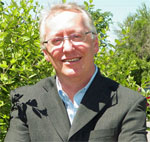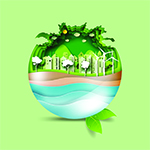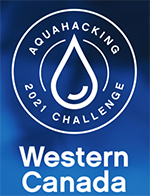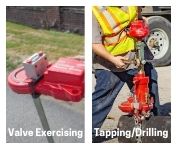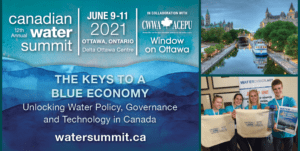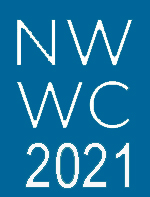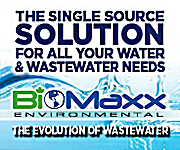 |
||||||||||||||||||||||||||||||
| Subscribe | Past Issues | www.cwwa.ca | Water Source Magazine | ||||||||||||||||||||||||||||||
|
CWWA News
World Water Day is coming, March 22nd, and CWWA is excited to announce two major events that day. First, that is the day we will release Towards a Sustainable Utility: a guidance document for water, wastewater and stormwater utilities. Led by the CWWA’s Utility Leadership Committee, this guidance document is a combined effort of all of our technical committees. With that purpose of helping to move utilities to being more sustainable, we recognized that this concept of sustainability involves ALL aspects of a utility. In the document, we identify several critical challenges facing all utilities, suggest a few best practices and point you to more resources if you want to get active on that issue.
Over the past two months we've had great conversations about sustainable utilities focusing on different aspects of water management, and how we build sustainable utilities.
CWWA is proud to support the Western Canada 2021 AquaHacking Challenge in the role of Water Issue Leader. The AquaHacking Challenge is a professional development program and tech startup competition for students and young professionals who want to have a positive impact on water. Having helped establish 28 water tech startups since 2015, the AquaHacking Challenge is a recognized pre-incubator program supporting some of the newest and most innovative tech solutions and youth-led startups in the water sector today.
Federal Initiatives
The 2nd version of the Technical Guidelines for Canada’s new Environmental Emergency Regulations, 2019, were posted on the Environment and Climate Change Canada website on December 30, 2020. The guidelines are designed to help regulatees understand the requirements of these regulations and how to comply with them. The Canadian Environmental Sustainability Indicators (CESI) program provides data and information to track Canada's performance on key environmental sustainability issues including climate change and air quality, water quality and availability, and protecting nature. The environmental indicators are based on objective and comprehensive information and convey environmental trends in a straightforward and transparent manner. The Government has released results for several indicators including the following: The Minister of Northern Affairs, Daniel Vandal, recently launched the 2021-2022 Call for Proposals for research, monitoring and related activities concerning contaminants that originate in other parts of the globe and are transported through air and sea currents to Canada’s North and Arctic. Under the Northern Contaminants Program, the Government of Canada is providing $1 million in 2021-2022 for new projects focusing on environmental and community-based monitoring and research; health research; and capacity, communications and outreach activities. This will also include projects addressing knowledge gaps related to plastic pollution in Canada’s Northern and Arctic regions, as part of Canada’s Plastics Science Agenda. Applicants have until February 15, 2021, to submit their proposals. Projects selected for funding will be announced in the summer of 2021. On December 17, 2020, the Minister of Environment and Climate Change and the Minister of Agriculture and Agri-Food announced the launch of public consultations to establish a new Canada Water Agency ("CWA"). Comment deadline: March 1, 2021. CWWA is working with a small subcommittee from our technical committees to respond to the discussion document. We are eager to participate in the development of the Agency. Window on Ottawa is CWWA's signature event focused on federal water policy. It is a unique event where you learn about everything you ever wanted to know about water at the federal level…and were afraid to ask. The most senior national policymakers from each federal department and agency are invited to the event—not to tell us what they’ve already released, but to tell us what they’re working on now and what is coming next. The Window on Ottawa is a fascinating forum to engage with these policymakers at a very early stage and leave with an understanding of what to expect as a water leader. CWWA will continue its collaboration with Water Canada in 2021. In conjunction with the Canadian Water Summit, sessions of the Window on Ottawa will be taking place on June 8-10, 2021 in Ottawa, Ontario.
As much as we’ve tried to stay connected and to share information ‘virtually’, nothing can replace the value of really being together. Video chat rooms are not the same as seeing old friends and networking with your colleagues. By November, it will be almost 2 years since we’ve gathered as professionals…and friends. Member News
This Standard covers drinking water treatment systems that are (a) point-of-use or point-of-entry plumbed systems; and (b) point-of-use non-plumbed systems. Note: Drinking water treatment systems covered by this Standard are intended to be used for the reduction or inactivation of harmful substances that can be present in drinking water. Contact: sarah.chung@csagroup.org; Review start date: January 10, 2021; Review end date: March 8, 2021. Access Draft (free log-in required) at:
Provincial News
Alberta Health recently released guidelines that assist in identifying the source, treatment and uses for all types of reclaimed water. These documents provide a significantly improved guidance document that follows the Canadian regulatory model and is intended to support owners, users, manufacturers, designers, installers and local authorities having jurisdiction when considering reclaimed water. Links to this information are here: CWWA is an active member of the CACP, where we are represented by Beth Weir, Region of York. Snippings & Clippings
Water Canada Canadian cities received a C grade on flood preparedness in a study conducted by the University of Waterloo's Intact Centre on Climate Adaptation. The Hill In the waning days of the Trump administration, the Environmental Protection Agency (EPA) issued its much anticipated revisions to the Lead and Copper Rule (LCR), which regulates heavy metals in drinking water. Lead and copper leach from plumbing materials like piping, solders and plumbing fixtures. This occurs in our homes, places of work, schools and anywhere else people expect to drink water. Water Canada "Watershed management strives to improve the health of aquatic ecosystems as much as it does the economic, cultural, and biophysical health of our communities," writes Elaine Ho in Water Canada's latest feature. Water Canada "The story of PFAS is a fascinating one that begins innocently enough in the early 1900’s with the invention of freonTM," writes Martin Bureau, VP Innovation at Logistec Environment. "The story gets even more interesting with an experiment that changed the world in 1938 when a 27-year-old research chemist at Dupont mixed chemicals expecting one result, and instead discovered Teflon." CNN The city of Newark, New Jersey, resolved years long litigation Tuesday in connection to its water crisis, in which city drinking water was contaminated with illegally high levels of lead. Officials from the city and the New Jersey Department of Environmental Protection (NJDEP) reached an agreement with the Natural Resources Defense Council and the Newark Education Workers Caucus, which sued city and state officials in June 2018 for ongoing violations of the federal Safe Drinking Water Act, including their failure to address the lead crisis on a timely basis UPI President Joe Biden declared a major disaster in Texas as power outages are declining but water shortages continue to pose problems due to damage caused to pipes and water mains by the subfreezing cold this week. Star Phoenix When something goes amiss at the Moosomin First Nation water treatment plant, Nathan Martell is often the man who gets a call. Whether it’s a power outage in the middle of the night or a broken part on a weekend, Martell or one of his two co-workers, who are often on call, will troubleshoot from home or the plant to make sure the 238 homes in their community have access to safe drinking water. ESE Magazine Less than 1% of Canada’s engineers identify as Indigenous, according to a new report by Engineers Canada, which estimates the sector needs an additional 5,620 Indigenous engineers for a basic level of representation. International News
The U.S. Centers for Disease Control and Prevention (CDC) released a new guide for controlling Legionella in commonly implicated sources of Legionnaires’ disease outbreaks. The guide “Toolkit for Controlling Legionella in Common Sources of Exposure” addresses potable water systems specifically. Notably for potable water, CDC says that samples having less than 1.0 cfu/mL means the system is well controlled if other parts of the water management plan are working fine. CNN A hacker gained access into the water treatment system of Oldsmar, Florida, on Friday and tried to increase the levels of sodium hydroxide -- commonly referred to as lye -- in the city's water, officials said, putting thousands at risk of being poisoned. Water Online As a new administration assumes executive power in the United States, perhaps no federal agency embodies the stark change in direction better than the one charged with governing drinking water, wastewater, and source water quality rules — particularly legislation like the federal Lead and Copper Rule (LCR). CWWA Member Profiles
The Walkerton Clean Water Centre (WCWC) is an agency of the Government of Ontario, established in 2004, to help ensure clean and safe drinking water. WCWC coordinates and provides education, training and information to water system owners, operators and operating authorities, and the public, in order to safeguard Ontario’s water.
Our story began over 125 years ago in Edmonton as Canada's first municipally owned electric utility and, ten years later, Edmonton's water utility. We provide clean water, wastewater and drainage services, and safe, reliable energy to residential and commercial customers. We build, own and operate electrical, natural gas and water transmission and distribution networks; water and wastewater treatment facilities; sanitary and stormwater systems;, and infrastructure in Canada and the United States. We also provide electricity, natural gas and water products and services to residential and commercial customers. The City of Edmonton is our sole Shareholder, and we operate as a commercial entity, governed by an independent Board of Directors. Since incorporating in 1996, we've achieved exceptional growth and have more than doubled our dividend. |
||||||||||||||||||||||||||||||
